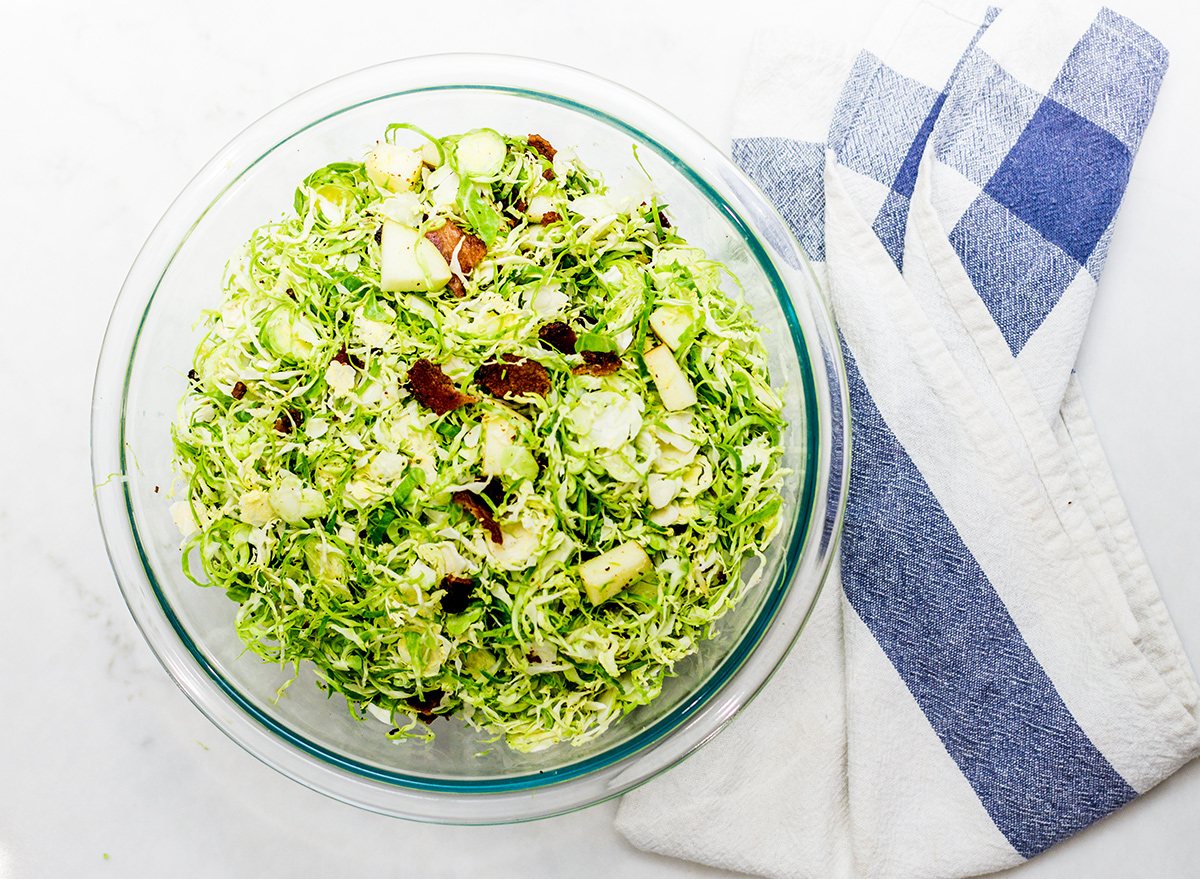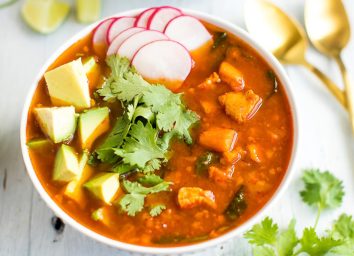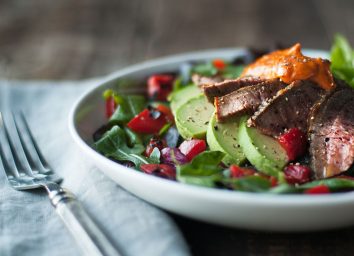What Are the Benefits of Whole30? We Asked the Experts

Americans are obsessed with processed foods. It's hard to resist all the fast food on commercials, not to mention all the chips, soda, cookies, and snacks that are constantly hitting the grocery store shelves, which is why the Whole30 diet has had a surge in popularity among those trying to eat better and cut out junk food and processed foods.
From cutting out sugar and alcohol to upping produce, there are tons of benefits that happen when you try the Whole30 diet, but there are also some pretty major downsides. Here's everything you should know about the benefits (and negatives) of the Whole30 diet.
What is the Whole30 diet?
As it says in its title, the Whole30 diet usually starts with the goal of completing 30 days.
"The Whole30 program is a 30-day program that eliminates added sugars, artificial sugars, alcohol, beans, grains, dairy, and preservatives," says Monica Auslander Moreno, MS, RD, LD/N, registered dietitian and nutrition consultant for RSP Nutrition. "The well-intentioned point is to eliminate processed foods from one's diet."
The Whole30 diet has been around since April 2009, and there are specific rules to follow when you're on it.
It's a pretty well-structured plan that lays out exactly what Whole30 diet foods you can't eat. This includes cutting out:
- Sugars/artificial sugars: Maple syrup, honey, agave nectar, coconut sugar, date syrup, monk fruit extract, stevia, Splenda, Equal, NutraSweet, and xylitol.
- Alcohol: In any form, even for cooking.
- Grains: Wheat, rye, barley, oats, corn, rice, millet, bulgur, sorghum, sprouted grains, quinoa, amaranth, and buckwheat. This also includes bran, germ, and starch.
- Legumes: Beans of all kinds (black, red, pinto, navy, white, kidney, lima, fava, etc.), peas, chickpeas, lentils, peanuts, peanut butter, and all forms of soy: soy sauce, miso, tofu, tempeh, edamame, and soy lecithin.
- Dairy: Cow, goat, or sheep's milk products like milk, cream, cheese, kefir, yogurt, sour cream, ice cream, or frozen yogurt.
What are the benefits of Whole30?
One of the biggest benefits of trying the Whole30 diet is that it cuts out processed food, a giant part of today's American diet.
"It provides structure or boundaries, which for many people are not intuitive," says Sonya Angelone, MS, RDN, CL, spokesperson for the Academy of Nutrition and Dietetics. "It focuses on whole, minimally processed foods. It severely restricts the very foods that were contributing to poor eating or bad health problems. For some people, it contains more healthful foods than they were eating (before), and you may stop craving processed foods."
Essentially, you're cutting out the 'bad' and adding in the 'good.'
"It does emphasize fresh fruits, vegetables, nuts, seeds, healthy fats, and lean proteins," says Auslander Moreno.
This also can have amazing benefits for weight loss and your overall health.
"The focus is on health, not just weight loss, although I think most people try it to lose weight. It should help decrease inflammation," says Angelone. "For many people, they have improved digestion and no gas or bloating, better blood sugar control, lower blood pressure, and weight loss. A nice benefit is that you will be able to identify a problem food once you reintroduce it back into your diet."
While the Whole30 diet may have 'diet' in the name, it actually doesn't involve typical aspects of a 'diet' standard.
"It's for people who don't want to count calories or portions," says Angelone.
Another great benefit? You'll be saving money.
"It emphasizes cooking at home, which is a great lifestyle change to make," says Auslander Moreno. This means you'll also be eating out less by not dining out all the time.
What are the downsides?
One of the biggest downsides is how restrictive it is, which can impact your body's health.
"This diet is quite restrictive—a life without grains and legumes can lead to microbiome derangements since vital fibers in these foods provide food for intestinal microorganisms," says Auslander Moreno. "Eliminating dairy throws out a large source of dietary calcium and vitamin D—we actually rarely recommend eliminating dairy for most folks."
It may have some negative mental health aspects, too.
"It's also not feasible (or fun) for some people to avoid their favorite cherished foods, and this can contribute to anxiety, shame, guilt, and obsession surrounding foods," says Auslander Moreno. "In those at risk, disordered eating patterns and thoughts can emerge from a restrictive diet like this." The Whole30 Diet also requires a lot of time to cook and meal plan between planning meals, making the meals, and even taking time to properly read food labels.
While there's no such thing as a perfect diet, if you're interested in trying Whole30 diet, it's best to discuss with your doctor and consult with an expert for guidance and support.
"Talk to a registered dietitian nutritionist to find out what the real culprits in your diet are so you don't have to give up so many foods," says Angelone. "It's important to have support to ensure success, even if for just a month."








